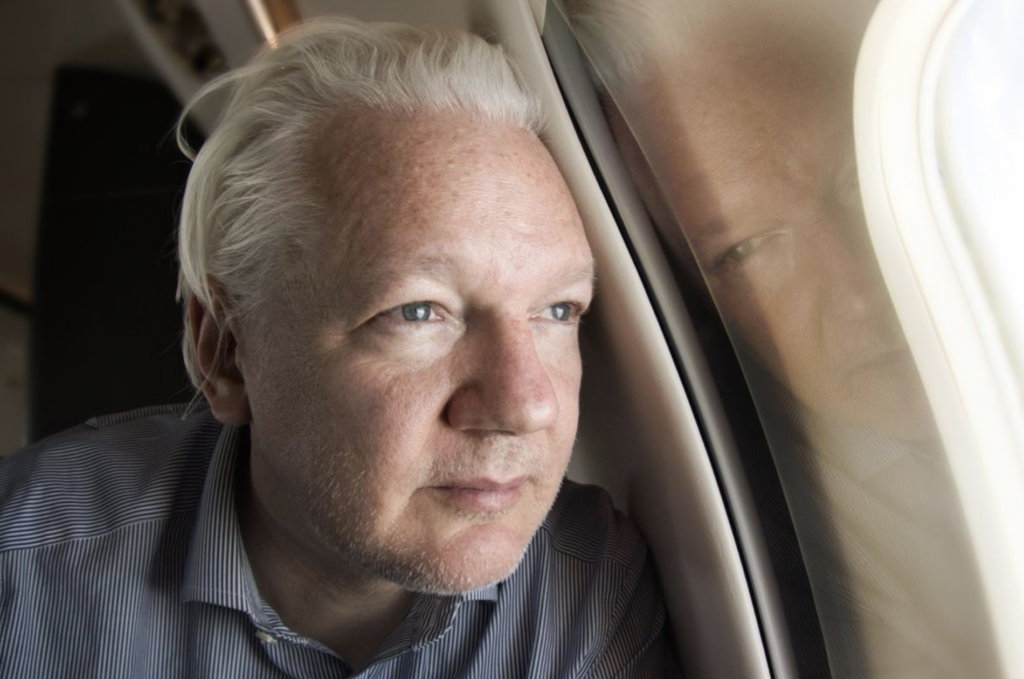The End of the Biggest Press Freedom Case of the Century
MEDIA, 1 Jul 2024
Kevin Gosztola | The Dissenter – TRANSCEND Media Service
25 Jun 2024 – A global effort by advocates, campaigners, journalists, organizers, and supporters of WikiLeaks founder Julian Assange pushed President Joe Biden’s administration to finally free Assange.
A global effort by advocates, campaigners, journalists, organizers, and supporters of WikiLeaks founder Julian Assange pushed President Joe Biden’s administration to finally free Assange.
On June 24, Assange left His Majesty’s Prison Belmarsh in London. He flew to the Northern Mariana Islands, a United States commonwealth in the Pacific Ocean. He was scheduled to plead guilty to one count of conspiracy to obtain and disclose national defense information under the Espionage Act and then fly home to Australia.
The U.S. Justice Department agreed to a sentence of about five years, a little less than the time that he spent detained at Belmarsh. They also agreed to a plea deal without requiring Assange to travel to the continental U.S. for a hearing in the Eastern District of Virginia courthouse just outside of Washington, D.C.
WikiLeaks credited the worldwide campaign for Assange’s freedom for creating space for a “long period of negotiations” with the Justice Department, which led to a deal.
His wife Stella Assange declared in a video recorded on June 19, “Throughout the years of Julian’s imprisonment and persecution, an incredible movement has been formed, a movement of people from all walks of life from around the world, who support not just Julian, and not just us and our family, but what Julian stands for—truth and justice.”
“We still need your help. What starts now with Julian’s freedom is a new chapter,” she added.
“The cost to Julian, of course, has been to deprive him of freedom for all these years in the battle for journalistic freedom and freedom to publish—the foundation of democracy,” WikiLeaks editor-in-chief Kristinn Hrafnsson stated in the same video.
But Hrafnsson made it clear this “important day of joy, the day of Julian’s freedom” would not have been possible without the support of people from all over the world.
A Movement Freed Assange
It was always evident that the U.S. and British courts would not save Assange. Only a political resolution would free Assange, and I wrote my book, “Guilty of Journalism: The Political Case Against Julian Assange,” to help bring about this incredible moment.
Assange was expelled from Ecuador’s London embassy on April 11, 2019. He was immediately arrested and transported to Belmarsh, and the Justice Department unsealed a criminal charge that accused Assange of conspiring with U.S. Army whistleblower Chelsea Manning to crack a password.
Much of the news media coverage contended that the computer crime charge showed that U.S. prosecutors were not about to endanger traditional investigative journalism. But that misguided framing ended when the Justice Department unveiled seventeen charges under the Espionage Act on May 23, 2019.
The unprecedented charges effectively criminalized standard newsgathering activities that Assange engaged in as WikiLeaks editor-in-chief when he published classified U.S. government documents from Manning, which detailed the wars in Iraq and Afghanistan, false intelligence against Guantanamo Bay prisoners, and U.S. foreign policy throughout the world.
Diplomatic cables showed the lengths that U.S. officials would go to interfere in European countries in order to ensure that U.S. soldiers or CIA agents were not prosecuted for their role in torture and rendition.
While Assange languished in prison, reporting from the Spanish newspaper El País and Yahoo News revealed that a Spanish security company called Undercover Global S.L. spied on Assange while he was in the Ecuador embassy. The CIA backed the company’s espionage operation.
Even worse, under CIA Director Mike Pompeo the agency allegedly sketched out plans to kidnap or assassinate Assange. Pompeo was obsessed with seeking revenge after WikiLeaks published “Vault 7” materials that exposed how the CIA engaged in offensive cyber warfare.
This Plea Deal Is A Defeat For the National Security State
The Assange case was the most high-profile press freedom case of the 21st century, and U.S. prosecutors came closer than ever to putting a journalist and publisher through an Espionage Act trial in a U.S. court. But Assange and his legal team secured a plea deal—a massive defeat for the CIA, the FBI, and Justice Department personnel, who backed targeting, detaining, and prosecuting the WikiLeaks founder under Biden and President Donald Trump.
Unmistakably, U.S. government officials damaged world press freedom by indicting and jailing a non-U.S. citizen and journalist for five-plus years while seeking their extradition. A plea deal, however, “does not create a legal precedent,” as U.S. constitutional lawyer Bruce Afran told Consortium News. By fighting back against this political case, Assange and the movement that supported him successfully dodged a much worse outcome.
Absent from the “criminal information” [PDF] that makes up the guilty plea are the slanderous claims that Assange published the names of “confidential human sources,” or U.S. informants, and has blood on his hands. The plea also never singles out Assange for publishing documents on the internet. And it contains no mention of a password-cracking conspiracy, which U.S. prosecutors fabricated to further their narrative that Assange engaged in hacking not journalism.
Australia Prime Minister Anthony Albanese and the Australian parliament backed a resolution in February that demanded that the U.S. government end the Assange case.
Faced with intense opposition from Australia, plea negotiations between Assange’s legal team and Justice Department officials unfolded for months. Unnamed sources spoke about a plea deal to a few members of the press, though admittedly it was hard to tell if U.S. prosecutors were engaged in good-faith negotiations.
But in May, as journalist Mohamed Elmaazi reported for The Dissenter, the U.S. government hit its first roadblock in a long time and one that would be potentially difficult to overcome. The British High Court of Justice granted Assange an appeal hearing after determining that there was an arguable risk that Assange would be prejudiced at trial due to his nationality because the First Amendment does not cover non-U.S. citizens.
The High Court scheduled an appeal hearing for July 9-10. It is possible that the Justice Department opted to resolve the case because officials feared the High Court could rule in favor of Assange and draw a conclusion about the First Amendment and the European Convention on Human Rights that would be a nuisance for future U.S. extradition requests.
Whatever the reasons, Assange will be home in Australia for the first time in over a decade. He lived under some form of arbitrary detention from 2010 to 2024—Wandsworth Prison in London, house arrest in the U.K., political asylum in Ecuador’s London Embassy, and confinement at Belmarsh (“Britain’s Guantanamo”).
Assange’s mental and physical health significantly deteriorated. He was no longer attending court proceedings, and at one point, a British district court even ruled that it would be oppressive for mental health reasons to allow the U.S. government to extradite Assange. (The decision was later overturned by the High Court.)
Stella Assange announced in her video message that there would be an emergency fund started for “Julian’s health and recovery.” She also revealed that the U.S. government forced Assange to pay for the cost of a charter flight. He owes £520,000 and is raising funds here.
The U.S. national security state would have been comforted if Assange had died at Belmarsh, but the opposite happened. He walked out of Belmarsh. The world saw a refreshing image of someone boarding a plane, who was once one of the best known political prisoners.
Many of us recognize that the end of the biggest press freedom case in the 21st century does not represent an end to this important struggle for freedom of the press. The U.S. government will continue to try and define “responsible journalism” in a manner that protects the military and national security agencies.
There will be another attempt to prosecute a journalist under the Espionage Act, especially as long as the 1917 law is not abolished or reformed. Or the U.S. government will further innovate extralegal means to suppress journalism. The Espionage Act is not the only weapon available to prosecutors.
When U.S. officials brazenly attack freedom of the press, those who were part of the movement to free Julian Assange will recognize the attack immediately, and hopefully there will be just as much of a concerted effort to fight back as there was in Assange’s case.
___________________________________________
Kevin Gosztola is managing editor of Shadowproof, host of the Dissenter Weekly, co-host of the podcast Unauthorized Disclosure, and member of Society of Professional Journalists (SPJ).
Go to Original – thedissenter.org
Tags: Activism, Assange, Belmarsh Prison, Belmarsh Tribunal, Big Brother, Cryptome, Ecuador, Human Rights, John Young, Journalism, Justice, Media, Surveillance, Sweden, Torture, UK, UN, USA, Violence, Whistleblowing, WikiLeaks
DISCLAIMER: The statements, views and opinions expressed in pieces republished here are solely those of the authors and do not necessarily represent those of TMS. In accordance with title 17 U.S.C. section 107, this material is distributed without profit to those who have expressed a prior interest in receiving the included information for research and educational purposes. TMS has no affiliation whatsoever with the originator of this article nor is TMS endorsed or sponsored by the originator. “GO TO ORIGINAL” links are provided as a convenience to our readers and allow for verification of authenticity. However, as originating pages are often updated by their originating host sites, the versions posted may not match the versions our readers view when clicking the “GO TO ORIGINAL” links. This site contains copyrighted material the use of which has not always been specifically authorized by the copyright owner. We are making such material available in our efforts to advance understanding of environmental, political, human rights, economic, democracy, scientific, and social justice issues, etc. We believe this constitutes a ‘fair use’ of any such copyrighted material as provided for in section 107 of the US Copyright Law. In accordance with Title 17 U.S.C. Section 107, the material on this site is distributed without profit to those who have expressed a prior interest in receiving the included information for research and educational purposes. For more information go to: http://www.law.cornell.edu/uscode/17/107.shtml. If you wish to use copyrighted material from this site for purposes of your own that go beyond ‘fair use’, you must obtain permission from the copyright owner.
Join the discussion!
We welcome debate and dissent, but personal — ad hominem — attacks (on authors, other users or any individual), abuse and defamatory language will not be tolerated. Nor will we tolerate attempts to deliberately disrupt discussions. We aim to maintain an inviting space to focus on intelligent interactions and debates.

